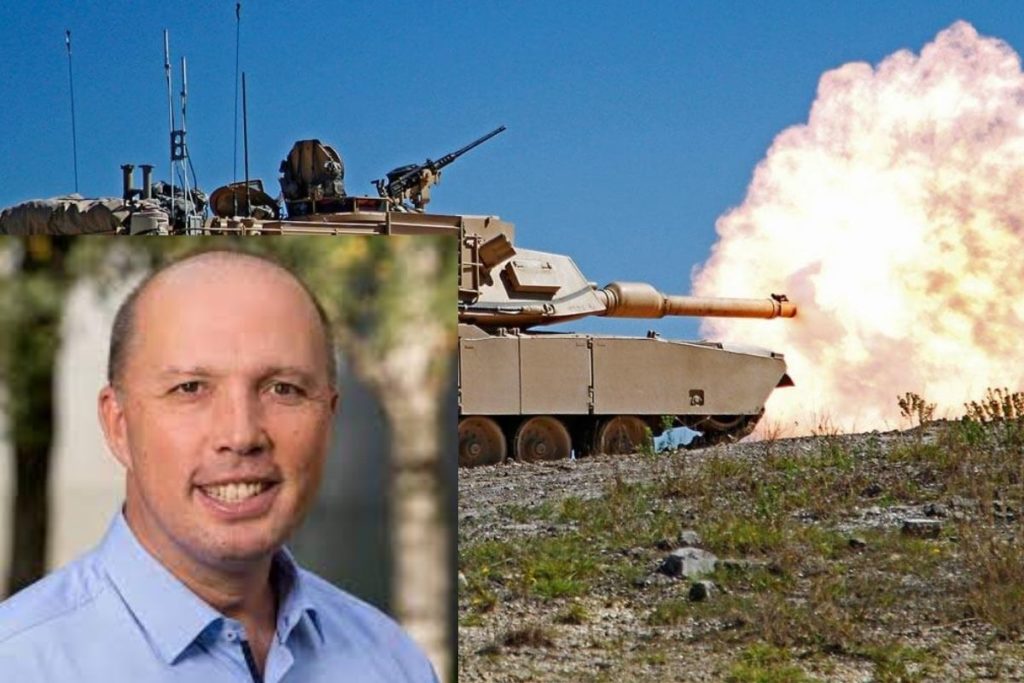When Defence Minister Peter Dutton announced that Australia will spend around $3.5 billion on 120 tanks and other armoured vehicles from the United States on Monday, he described the so-called investment as being about giving “our soldiers the best possibility of success and protection from harm”.
But this announcement is now without controversy. For a number of reasons.
In security circles, it’s already been heavily scrutinised. Australia has not deployed a tank in combat since the Vietnam War – almost fifty years ago. For the broader public, questions abound about how the Federal Government can justify spending an additional $3.5 billion on Defence. Government money that seemingly did not exist a week ago when Scott Morrison rejected federal investment in free Rapid Antigen Tests because “you can’t just make everything free”.
But are tanks a necessary investment? Does this kind of machinery reflect Australia’s current strategic concerns and national security? According to the Australian government’s own 2016 Defence White Paper, and independent experts, the answer is no.
If we dive into the 2016 Defence White Paper, the most recent white paper on Australia’s national and regional security, a range of security threats are explored. These range from cyber and space warfare, to terrorism and state fragility in our immediate neighbourhood. Tanks are mentioned just once in the almost 200-page document, a throwaway line about “tank upgrades” as part of a broader investment in amphibious warfare (see page 97 and 98).
The security risks described in the White Paper are truly complex. Issues like cyberwarfare need investment in Australia’s cyber capabilities, but also investment in the security of our core infrastructure like train networks and hospitals, and better cyber education. Similarly, another threat flagged in the White Paper – pandemics – has proven an acute risk to the wellbeing of our community. Pandemics are also multi-faceted, requiring investment in biosecurity protocols, our healthcare system and international coordination.
Another major threat to Australia’s long-term national and regional security (carefully downplayed in the Defence White Paper) is climate change.
As the world hurtles towards 1.5°C global warming. the future of Australia’s defence force seems inextricably linked with summers of bushfire management and winters of evacuating people from floods. The biggest disruptions to our economy and communities will be near annual lockdowns over summer as we choke on smoke, and the loss of tourism along the coasts as our beaches erode and our reefs bleach. The Australian way of life is most threatened by our own addiction to fossil fuels.
These challenges require collaborative responses – bringing together experts from different fields to best chart a path to prosperity.
There is no room for hyper-masculine power fantasies.
I’m sure Dutton feels very powerful right now playing out the tough defence-man act. But does this power fantasy make you feel safe?
Make no mistake, this announcement is not about actually contributing to Australia’s long-term security. If that was the case, Dutton would be announcing steep emissions reductions, or long-term investments in Australia’s pandemic response framework – maybe even real action on women’s safety.
No, this announcement is part of the Federal Government’s rapidly accelerating election strategy. Where, once again, they’re pulling out the “tough security guy” bit, hoping that voters are distracted by the drums of war.
These drums of war have been pounding louder in the last few years, as anti-China sentiment rises in national security circles. But we are not at war with China, nor are we at war with any other country. We are however under massive strain from the spread of Omicron, and we are facing a looming climate crisis.
But the drums of war can be awfully distracting until you look behind the pounding mallets to see the drummers are our own government.
Annika Reynolds, is a young leader in the climate justice movement. They are the CEO and Founder of GreenLaw, a law reform and research institute empowering the next generation of lawyers to tackle the climate crisis and a Board Director for Zero Emissions Noosa Inc. Annika is a current Laws (Honours)/International Security Studies student at ANU and a published researcher on public interest environmental litigation, and the human impacts of climate change.


